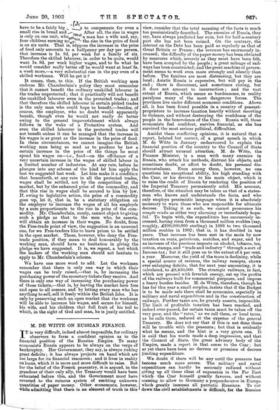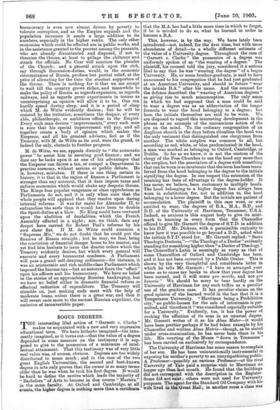M. DE WITTE ON RUSSIAN FINANCE.
IT is very difficult, indeed almost impossible, for ordinary observers to form a confident opinion as to the financial position of the Russian Empire. To many economists Russia appears to be always on the verge Of bankruptcy. Her Government, they say, is always risking great deficits ; it has always 'projects on hand which are too large for its financial resources; and it lives in reality on loans, which it is more and-more difficult to raise. But for the belief of the French peasantry, it is argued, in the grandeur of their only ally, the Treasury would have been exhausted before this, and the Government must have reverted to the ruinous system of emitting unknown quantities of paper money. Other economists, however, while admitting that there. is, an element of truth in this view, consider that the total meaning of the facts is much too pessimistically described. The enemies of Russia, they say, have always predicted her ruin, but for half-a-century past she has not been ruined. On the contrary, the interest on the Debt has been paid as regularly as that of Great Britain or Prance; the revenue has enormously in- creased; the difficulty of the paper money has been obviated by measures which, severely as they must have been felt, have been accepted by the people ; a great mileage of rail- ways has been constructed; and the great machine of govern- ment seems to work even more strongly and silently than before. The famines are most distressing, but they are local; Asiatic Russia is expensive, but will pay in the end ; there is discontent, and sometimes rioting, but it does not amount to insurrection ; and the vast extent of Russia, which seems so burdensome, in reality paralyses many of the most dangerous forces. The provinces live under different economic conditions. Above all, it has been found possible in a country of peasant- proprietors to increase taxation heavily without resorting to violence, and without destroying the confidence of the people in the benevolence of the Czar. Russia will, these economists feel confident, survive financial, as she has survived the most serious political, difficulties.
Amidst these conflicting opinions, it is natural that a report, belated but correct, of a great speech in which M. de Witte in January endeavoured to explain the financial position of the country to the Council of State should attract unusual attention. M. de Witte, the Finance Minister, is a man with many enemies in Russia, who attack his methods, distrust his objects, and sometimes doubt, or affect to doubt, his personal dis- interestedness. Even among them, however, no one questions his exceptional ability, his high standing with the Czar, or his devotion to his main object, which is to raise the credit of Russia by rendering the position of the Imperial Treasury permanently solid. His account, therefore, of the situation may be taken as that of a, states- man who knows and understands the facts, and who only employs pessimistic language when it is absolutely necessary to warn those who are responsible for ultimate decrees. Taking it as such, we cannot pronounce his compte rendu as either very alarming or immediately hope- ful. To begin with, the expenditure has enormously in- creased, having risen from a thousand million roubles (say, roughly, £100,000,000 sterling) in 1893 to two thousand million roubles in 1902; that is, it has doubled in ten years. That increase has been met in the main by new taxation on rents, petroleum, matches, and sugar, and by an increase of the previous imposts on alcohol, tobacco, tea, cotton, stamps, and "trade and industry" through a sort of Income-tax; but. it still goes on to the extent of 4 per cent. a year. Moreover, the yield of the taxes is declining, while a special source of revenue, the railway receipts, shows ever enlarging deficits, that for next year amounting, it is calculated, to £8,450,000. The strategic railways, in fact, which are pressed with feverish energy, eat up the profits of the railways built for commercial purposes, and impose a heavy burden besides. M. de Witte, therefore, though he has for this year a. small surplus, insists that if the Budget is to be made safe there shall be economies, especially in military and naval expenditure and in the construction of railways. Further taxes are, he gravely asserts, impossible. The limit of profitable taxation has been reached, and indeed over-passed, for certain taxes must be taken off the very poor, and the "rates," as we call them, or local taxes, as he calls them, reduced at the expense of the general Treasury. He does not say that if this is not done there will be trouble with the peasants; but that is evidently what he means, and the hint is a very grave one. It is said that his words made a deep impression, and that the Council of . State, the great advisory body of the Empire, made a report in that sense to the Czar; but as yet there have been no decrees or promises of decrees limiting expenditure.
We doubt if there will be any until the pressure has become much more severe. The military and naval expenditure can hardly be seriously reduced without giving up all those ideas of expansion in the Far East which the Czar himself greatly favours, and without seeming to allow to Germany a preponderance in Europe which greatly incenses all patriotic Russians. To cut down'the-erril establishments is difficult, for the Russian bureaucracy is even now almost driven by poverty to tolerate corruption, and as the Empire expands and the population increases it needs a large addition to its numbers, especially in the higher ranks. The only other economies which could be effected are in public works, and in the assistance granted to the poorest among the peasants, who are already discontented and disposed, if not to threaten the throne, at least to pillage the châteaux and attack the officials. No Czar will sanction the plunder of the Church ; and a general attack upon the rich, say through Succession-duties, would, in the economic circumstances of Russia, produce but partial relief, at the price of alienating for the time the stoutest supporters of the throne. There 'is nothing for it that we see except to wait till the country grows richer, and meanwhile to make the policy of Russia as regards expansion, as regards railways, and as regards great experiments in tenure as unenterprising as opinion will allow it to be. One can hardly spend during sleep, and it is a period of sleep which M. de Witte evidently desires ; but he will be resisted by the irritation, sometimes the despair, of every able, philanthropic, or ambitious officer in the Empire. Every such man desires "improvements," every such man is sure that his special improvement will pay, and all together create a body of opinion which makes the Emperor, and all his greatest advisers, feel as if the Treasury, with M. de Witte as its soul, were the grand, or indeed the only, obstacle to further progress.
M. de Witte, we see, appeals directly to "the autocratic power" to assist him in securing good finance ; and we dare say he looks upon it as one of his advantages that the Emperor can decree a tax, or compel a Department to practise economy, without serious or public debate. He is, however, mistaken. If there is one thing certain in history, it is that in the region of finance a Parliament is stronger than any autocrat, that it dare impose taxes and enforce economies which would shake any despotic throne. The Kings fear popular vengeance or class opprobrium as Parliaments do not, and it is only when sure that the whole people will applaud that they resolve upon daring internal reforms. It was far easier for Alexander II. to enfranchise the serfs than it would have been to double the Spirit-duties at a blow. No King could have ventured upon the abolition of feudalities, which the French Assembly effected in a night ; nor, we think, dare any despot have carried Sir Robert Peel's reforms by his own sheer fiat. If M. de Witte could summon a "Supreme Mir," we do not doubt that he could put the finances of Russia straight ; but he may, we fear, bring the conviction of financial danger home to his master, and yet find him hesitate to issue the drastic orders which the Treasury evidently desires, but which every general will execrate and every bureaucrat condemn. A Parliament will pass a grand self-denying ordinance—for instance, it was an aristocratic and rich middle-class Parliament which imposed the Income-tax--but an autocrat fears the " effect " upon his officers and his bureaucracy. We have no belief in the stories of an approaching Russian bankruptcy, but we have no belief either in dramatic financial reform or effectual reduction of expenditure. The Treasury will stumble on, just making ends meet with the help of moderate loans, unless there is a great war, and then it will revert once more to the ancient Russian expedient, the emission of inconvertible paper.











































 Previous page
Previous page